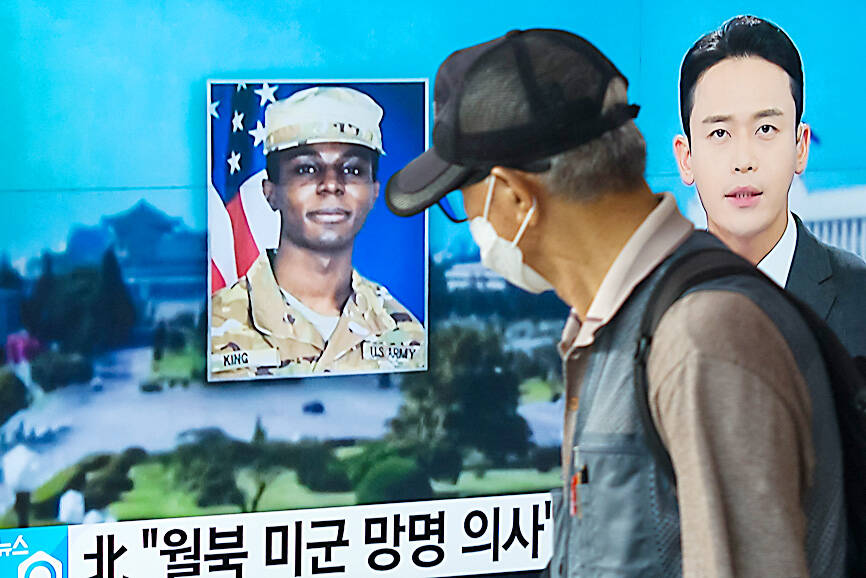Travis King defected to North Korea to escape “mistreatment and racial discrimination in the US Army,” Pyongyang’s state media said yesterday, in its first official confirmation that it is holding the US soldier.
A private second class with a checkered disciplinary record, King was due to fly back to the US last month, but instead slipped out of South Korea’s main airport, joined a tourist trip to the demilitarized zone and ran across the border into North Korea.
The US has previously said that King crossed the border at the Joint Security Area in the demilitarized zone separating the North and the South “willfully and without authorization.”

Photo: AFP
Following a North Korean investigation, King “admitted that he illegally intruded,” the Korean Central News Agency (KCNA) reported.
“Travis King confessed that he had decided to come over to the DPRK [Democratic People’s Republic of Korea] as he harbored ill feeling against inhuman maltreatment and racial discrimination within the US Army,” KCNA said.
King “came to be kept under control by soldiers of the Korean People’s Army” after he crossed the border, it said.
“He also expressed his willingness to seek refuge in the DPRK or a third country, saying that he was disillusioned at the unequal American society,” KCNA said, adding that a government investigation was still ongoing.
The UN Command, which oversees the armistice that ended fighting in the Korean War, last month confirmed it had begun a conversation with North Korea over King.
However, US Secretary of State Antony Blinken said at the time that while contact had been made with Pyongyang, Washington still had no idea where King was or in what condition.
KCNA did not provide any details about King’s health or location, or about what they planned to do with him.
North Korea’s first official comment on King was pure propaganda, said Soo Kim, policy practice area lead at LMI Consulting and a former CIA analyst.
“King’s crossing into North Korea provided the Kim [Jong-un] regime an opportunity in several ways, the first of which is, of course, the potential for negotiations with the US over King’s release,” she said, adding that Pyongyang has “tough negotiators,” so it would not be easy for Washington to secure his release.
Pyongyang has a long history of detaining Americans and using them as bargaining chips in bilateral negotiations.
“It’s also an opportunity for the regime propaganda to do its thing — to spin the situation in such a way as to criticize the US and express Pyongyang’s deep-rooted hostility towards Washington,” she added.
Just before it issued its comments on King, KCNA put out a statement criticizing discussion of Pyongyang’s rights record at the UN, describing the US as “the anti-people empire of evils, totally depraved due to all sorts of social evils.”
“Not content with conniving at and fostering racial discrimination, gun-related crimes, child maltreatment and forced labor rampant in its society, the US has imposed unethical human rights standards on other countries and fomented internal unrest and confusion,” the statement read.

The CIA has a message for Chinese government officials worried about their place in Chinese President Xi Jinping’s (習近平) government: Come work with us. The agency released two Mandarin-language videos on social media on Thursday inviting disgruntled officials to contact the CIA. The recruitment videos posted on YouTube and X racked up more than 5 million views combined in their first day. The outreach comes as CIA Director John Ratcliffe has vowed to boost the agency’s use of intelligence from human sources and its focus on China, which has recently targeted US officials with its own espionage operations. The videos are “aimed at

STEADFAST FRIEND: The bills encourage increased Taiwan-US engagement and address China’s distortion of UN Resolution 2758 to isolate Taiwan internationally The Presidential Office yesterday thanked the US House of Representatives for unanimously passing two Taiwan-related bills highlighting its solid support for Taiwan’s democracy and global participation, and for deepening bilateral relations. One of the bills, the Taiwan Assurance Implementation Act, requires the US Department of State to periodically review its guidelines for engagement with Taiwan, and report to the US Congress on the guidelines and plans to lift self-imposed limitations on US-Taiwan engagement. The other bill is the Taiwan International Solidarity Act, which clarifies that UN Resolution 2758 does not address the issue of the representation of Taiwan or its people in

US Indo-Pacific Commander Admiral Samuel Paparo on Friday expressed concern over the rate at which China is diversifying its military exercises, the Financial Times (FT) reported on Saturday. “The rates of change on the depth and breadth of their exercises is the one non-linear effect that I’ve seen in the last year that wakes me up at night or keeps me up at night,” Paparo was quoted by FT as saying while attending the annual Sedona Forum at the McCain Institute in Arizona. Paparo also expressed concern over the speed with which China was expanding its military. While the US

SHIFT: Taiwan’s better-than-expected first-quarter GDP and signs of weakness in the US have driven global capital back to emerging markets, the central bank head said The central bank yesterday blamed market speculation for the steep rise in the local currency, and urged exporters and financial institutions to stay calm and stop panic sell-offs to avoid hurting their own profitability. The nation’s top monetary policymaker said that it would step in, if necessary, to maintain order and stability in the foreign exchange market. The remarks came as the NT dollar yesterday closed up NT$0.919 to NT$30.145 against the US dollar in Taipei trading, after rising as high as NT$29.59 in intraday trading. The local currency has surged 5.85 percent against the greenback over the past two sessions, central